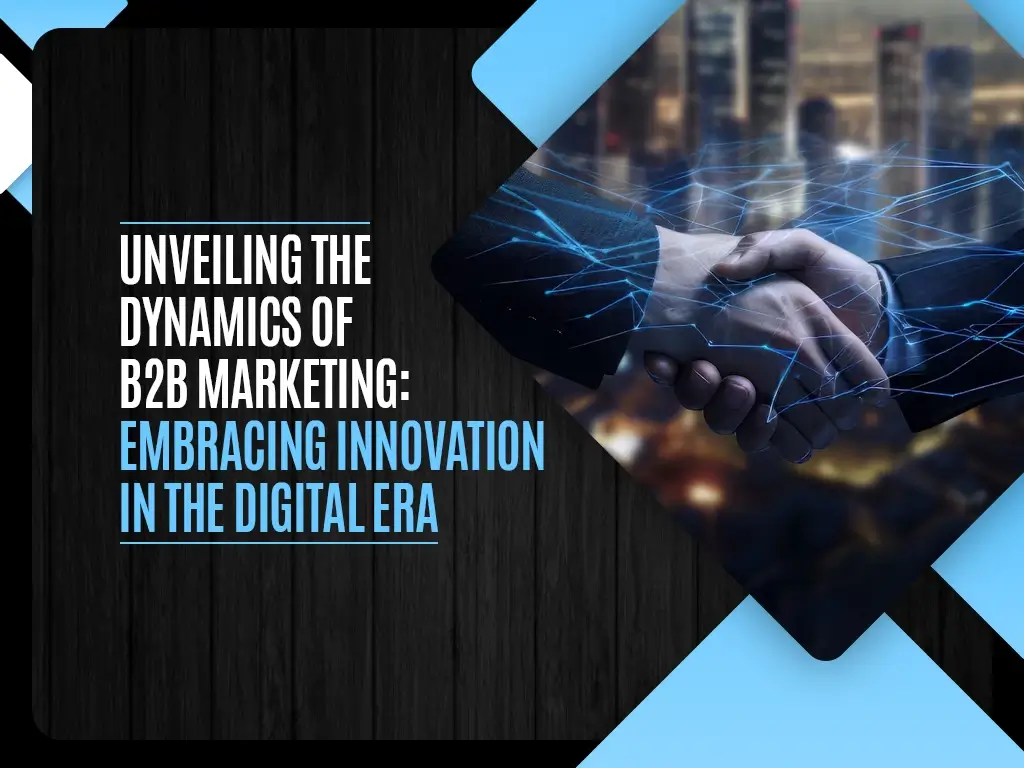Unveiling the Dynamics of B2B Marketing: Embracing Innovation in the Digital Era

In the realm of modern commerce, where businesses thrive in an interconnected digital ecosystem, the dynamics of marketing have undergone a profound transformation. Among the myriad facets of this evolution, Business-to-Business (B2B) marketing stands out as a crucial arena, where enterprises engage in a strategic dance to capture attention, forge partnerships, and ultimately drive growth. As the digital landscape continues to expand, the artistry of B2B marketing takes center stage, blending creativity, data-driven insights, and technological prowess to craft compelling narratives and foster meaningful connections.
At the heart of B2B marketing lies a nuanced understanding of the target audience. Unlike Business-to-Consumer (B2C) marketing, which often focuses on individual preferences and emotions, B2B marketing delves into the intricate web of organizational needs, priorities, and pain points. Whether it’s catering to small startups or multinational corporations, successful B2B marketers grasp the nuances of each client’s industry, challenges, and aspirations.
In the age of information overload, capturing and retaining the attention of B2B audiences presents a formidable challenge. This is where the art of storytelling emerges as a potent tool. Through compelling narratives, B2B marketers can transcend the realm of product features and benefits, weaving tales that resonate with their audience’s aspirations and values. Whether it’s showcasing how a software solution revolutionized a company’s operations or illustrating the transformative impact of a consultancy service, storytelling adds a human touch to the often impersonal world of B2B transactions.
However, storytelling alone is not sufficient to navigate the complex landscape of B2B marketing. In an era characterized by data abundance, leveraging insights-driven strategies is imperative. By harnessing the power of data analytics, B2B marketers can glean invaluable insights into customer behavior, preferences, and trends. From predictive analytics that forecast future market trends to customer segmentation techniques that tailor marketing efforts to specific audience segments, data serves as the cornerstone of informed decision-making in B2B marketing.
In parallel, the advent of digital technologies has revolutionized the way B2B marketers engage with their audience. From social media platforms to email marketing automation, digital channels offer a plethora of avenues to reach and influence decision-makers within target organizations. However, amidst this digital cacophony, relevance and personalization emerge as the linchpins of effective communication. By delivering tailored content and experiences based on the recipient’s role, industry, and interests, B2B marketers can cut through the noise and establish meaningful connections with their audience.
Furthermore, the rise of Account-Based Marketing (ABM) has redefined the paradigm of B2B marketing. By aligning sales and marketing efforts to target high-value accounts, ABM enables organizations to pursue a more personalized and strategic approach to customer acquisition and retention. From personalized email campaigns to targeted social media advertising, ABM empowers B2B marketers to tailor their messaging and outreach efforts to individual accounts, thereby increasing the likelihood of conversion and fostering long-term relationships.
Amidst the ever-evolving landscape of B2B marketing, the concept of non-owner car insurance serves as an illustrative example of the importance of understanding and addressing niche needs within target industries. Just as non-owner car insurance caters to individuals who frequently drive but do not own a vehicle, B2B marketers must identify and cater to niche requirements within their target market segments. Whether it’s providing specialized consulting services for niche industries or offering customizable solutions for unique business challenges, catering to niche needs demonstrates a deep understanding of the target audience and enhances the relevance and effectiveness of B2B marketing efforts.
In conclusion, B2B marketing represents a dynamic intersection of art and science, where creativity, data, and technology converge to drive meaningful engagement and foster long-term relationships. By embracing storytelling, leveraging data-driven insights, harnessing digital technologies, and catering to niche needs, B2B marketers can navigate the complexities of the modern business landscape with finesse and efficacy. As the digital revolution continues to unfold, the artistry of B2B marketing will undoubtedly evolve, shaping the future of commerce in profound and unforeseen ways.

